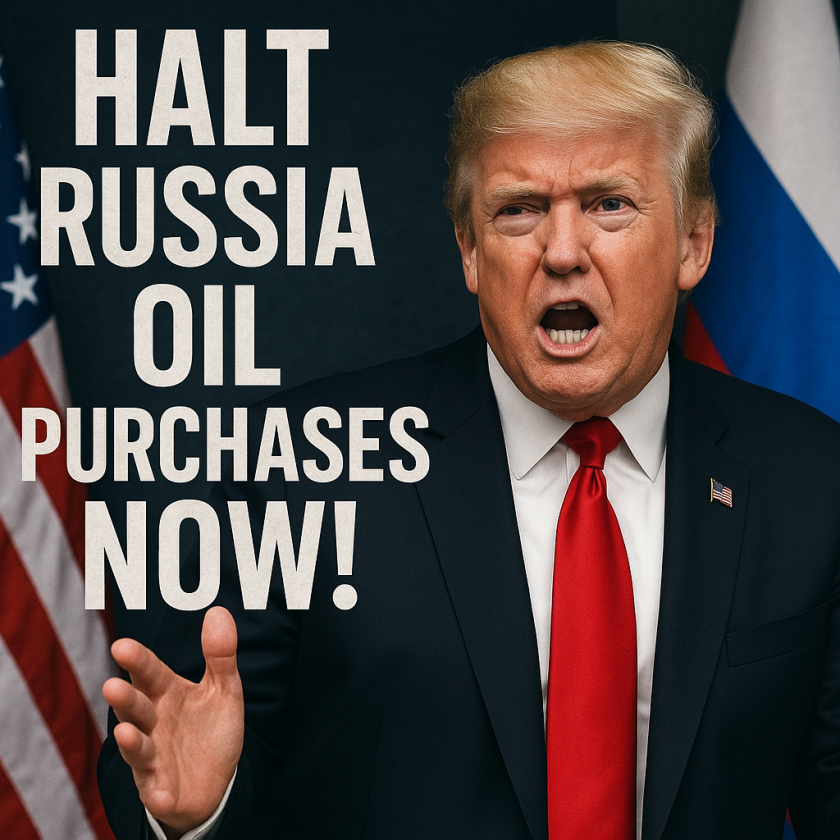Trump’s Urgent Call: Halt Russia Oil Purchases Now!
Trump’s Urgent Call: Halt Russia Oil Purchases Now!
In recent weeks, the geopolitical landscape has shifted dramatically, especially regarding energy dynamics in Europe. Former President Donald Trump has made a forceful statement urging NATO nations to stop purchasing oil from Russia before the implementation of U.S. sanctions. This call has ignited a complex debate about energy security, economic considerations, and the overarching implications for global diplomacy.
The Context: Energy, Sanctions, and Geopolitics

Trump’s announcement comes at a time when the world faces increasing pressure to address the environmental impacts of fossil fuels while navigating the repercussions of Russia’s ongoing military endeavors. His call resonates particularly with NATO allies who have historically depended on Russian energy supplies. According to an Al Jazeera report, Trump warned that European nations need to act quickly; delaying could empower Russia financially, making it harder to enforce sanctions that aim to deter further aggression.
However, this urgency is met with hesitation. Many European countries rely heavily on Russian oil and gas, with limited immediate alternatives available. For instance, the European Union has sought to diversify its energy sources but has often found the process cumbersome and slow. The risk of economic destabilization looms large if these countries pull back from Russian imports too quickly, suggesting a complex balancing act.
Economic Considerations and Dependencies
The reliance on Russian energy creates a multifaceted dilemma. Trump’s assertion that immediate action is essential aligns with broader goals of reducing geopolitical dependencies. As reported by Sky News, several European leaders are indeed contemplating how to minimize their energy reliance on Russia. Yet, there are also concerns about the economic fallout from hasty actions.
– Potential Risks:
– Economic instability in Europe due to energy shortages.
– Increased energy costs affecting households and industries.
– Possible backlash against governments seen as hastily enacting policies that impact the economy.
Conversely, proponents of immediate action argue that economic hardships must be weighed against the moral imperative to resist authoritarian regimes. By halting oil purchases, NATO countries could send a powerful message of unity and resolve, indirectly pressuring Russia to reconsider its military tactics.
A Divided Response Among Allies
The response to Trump’s call has showcased the divergent viewpoints among NATO members. Some leaders express that a swift halt may indeed be necessary, with an emphasis on long-term energy strategies that promote renewable sources. For instance, RT’s coverage highlights Eastern European nations, such as Poland and the Baltic States, which have historically been more vocal about reducing dependence on Russian energy — considering it not just an economic but a security threat.
Others, particularly some of the larger Western European nations, reveal a more cautious stance. The German government has indicated that while they wish to support sanctions, immediate cessation of Russian oil imports could lead to significant economic disruptions. As the debate continues, these contrasting perspectives highlight a fracture in NATO’s energy strategy.
Potential Solutions and Path Forward
Navigating this situation requires comprehensive strategies that account for both energy needs and geopolitical stakes. Key solutions may include:
– Accelerating Renewable Energy Initiatives: Investing in solar, wind, and other alternative energies could reduce reliance on fossil fuels, helping to transition to a more sustainable energy model.
– Strategic Stockpiling: Countries could work together to develop strategic reserves that would cushion any immediate collapse in supply when transitioning away from Russian oil.
– Increased Trade Among Allies: Strengthening inter-alliance trade agreements for energy supplies could help mitigate risks associated with sudden halts in Russian energy imports.
– Public Engagement: Informing the public about the necessity for change could ease potential backlash against governments implementing these policies.
Conclusion: Weighing Urgency Against Realities
Trump’s urgent call for NATO allies to halt Russian oil purchases is not a simple directive but a reflection of larger geopolitical realities. While immediate action may satisfy a strategic imperative, the complexity of energy dependencies presents a formidable challenge. As NATO navigates this urgent discourse, the path forward must harmoniously blend urgency with pragmatism.
Ultimately, the choices made now could shape the future of European energy security and international relations for years to come, leaving leaders to weigh the immediate risks against long-term aspirations for a less fossil-fuel-dependent world.






































